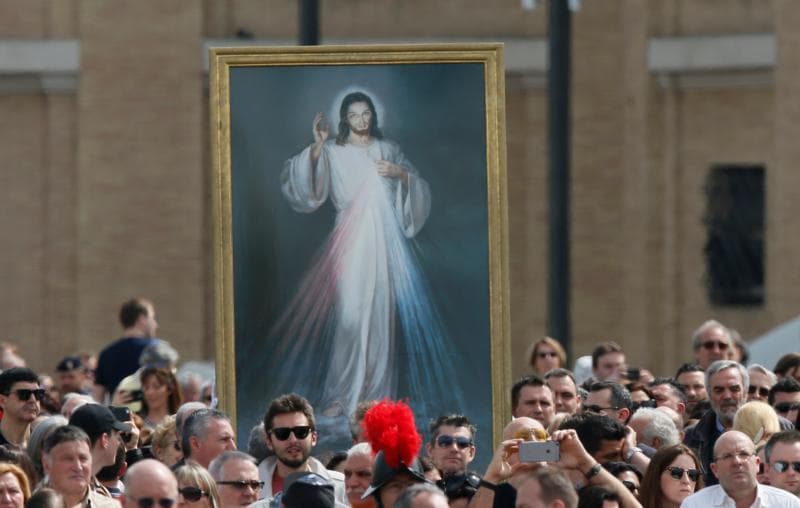It’s interesting that just a little while ago, today was called Low Sunday. It received such a name because, after all the liturgies and devotionals of the Sacred Triduum, the church seemed to take on a nomenclature that reflected the tiredness of both priests and people.
Let’s face it, the past week was spiritually intense, emotionally draining, logistically busy, and sometimes either a circus or a zoo in organizing choirs, ushers and greeters, altar servers, lectors, and everyone else. After such a whirlwind, it seems everyone is ready for a Low Sunday!
Except it’s not called Low Sunday anymore. Now, we have Divine Mercy Sunday and that brings along with it another whole set of expectations and devotionals.
What happened? Where’s our break? Why a Divine Mercy Sunday?
The answer isn’t too complicated. It only involves two world wars, rampant nihilism, a Polish religious, a pope of mercy, and the third Christian millennium!
Two world wars. In the Great War of the early twentieth century, the entire world found itself in an historically unparalleled state of worldwide combat. The nationalism that was driving the conflict and its accompanying trench warfare, chemical attacks, and nascent air bombings only brought unprecedented destruction to the human family.
Peace was attempted in 1918 but an intemperate diplomacy, still driven by nationalism and a desire to punish the vanquished, only led to further tension and a second worldwide conflict seemingly hell bent on surpassing the first in the devastation it would inflict upon the human race.
The Second World War would ignobly conclude with the ghastly dropping of two atomic bombs on two cities full of homes and parks, families, and children.
Rampant nihilism. Such overwhelming wreckage and slaughter of human life traumatized the human spirit. People were both numb and in denial over what had happened, what they had participated in, or what they refused to denounce.
In a false comfort to weary souls, many concluded that the appalling series of events were just an evil without reason. And so, in the absence of rational explanation, nihilism pervaded as its own poisonous gas and humanity desperately breathed it in.
Nihilism convinced the survivors of humanity’s evils: There is no explanation, no meaning, no purpose, and no value. It’s all nothing.
The person intoxicated by such a nihilism runs the risk of living as an empty soul, moved only by momentary pleasure or self-interest. Transcendental experiences are explained away and relationships are marked by tension and a will to power. Life is just a flow of subjective satisfactions lacking any real sense of rationality.
A Polish religious. In the throws of these world wars and within the arena of the competitive spirits of nationalism and nihilism that sought to possess the human soul, a simple Catholic religious sister, hidden away from the world, received a liberating message for the human family.
The mystic, Faustina Kowalska, was given a powerful answer “ever ancient, ever new” to the turmoil and sufferings of humanity. Jesus appeared to her in her moments of prayer and shared with her the proclamation of Divine Mercy. For a desert, it would have been an ocean. For shadows, it would have been the sun. For humanity, the Divine Mercy was (and is) a declaration of love and a hope.
As Pope St. John Paul II taught: “It is this love which must inspire humanity today, if it is to face the crisis of the meaning of life, the challenges of the most diverse needs and, especially, the duty to defend the dignity of every human person.”
A pope of mercy. It would be exactly John Paul who would reveal and heavily endorse this message of Divine Mercy to the universal church. This backing included changing Low Sunday to the Divine Mercy Sunday. The pontiff even purposely waited to canonize Faustina so that she would be the first saint of the twenty-first century.
The third Christian millennium. In the Mass proclaiming her a saint, John Paul explained: “Sister Faustina’s canonization has a particular eloquence: by this act I intend today to pass this message on to the new millennium.”
And so, the third Christian millennium began with a canonization of the Divine Mercy.
In asking why we lost our Low Sunday, therefore, the response is painfully obvious. The human family is still in tremendous need of healing and hope, of both receiving mercy and sharing compassion with one another.
As good things often require sacrifice, so the comfort of a quiet and relaxing post-Easter Sunday now gives way to the celebration of a Divine Mercy Sunday with all its appropriate fanfare and devotions.
Low Sunday now bows to the Divine Mercy Sunday so that forgiveness and tenderness are proclaimed and the world hears a different message than one of emptiness or hate and is shown a path to reconciliation and peace.











